Onel Hernandez: Norwich City winger and his country's curious football scene
- Published
- comments

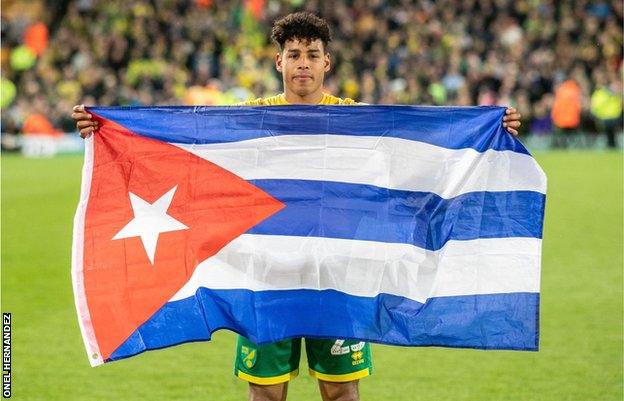
After helping Norwich win promotion to the Premier League, Hernandez celebrated at Carrow Road with the flag of Cuba
It is a typically sweltering Saturday morning in central Cuba, and in the sleepy town of Moron, where rickshaw drivers seek shade and pigs are read their last rites amid growling motorbikes, a gentle-faced mother-of-four sits near the town square, phone in hand.
Here, in one of the world's last communist outposts, where access to the internet is both sketchy and restricted, such plazas double up as WiFi zones. The woman, having entered the 12-digit password on the back of her US$1 internet card, logs in, loads up Google News, and types: "Onel Hernandez."
This is how the mother of the Premier League's first Cuban footballer follows her son's career.
Hernandez, Norwich City's 27-year-old winger, is a history-maker. But this is a story as much about his birthplace and its curious relationship with football as the man himself.

Moron is known mostly as a transport hub, a stop-off for the rusting ramshackle trains that connect Cuba's east and west. The town is suffocatingly hot and humid. The average monthly salary is 777 pesos, the equivalent of around £25.
Tourists in hot-pink Cadillac taxis might stay for lunch en route from the southern city of Trinidad to the paradise cays in the north, but most who visit Moron do not linger long. For Onel Lazaro Hernandez Mayea it was no different.
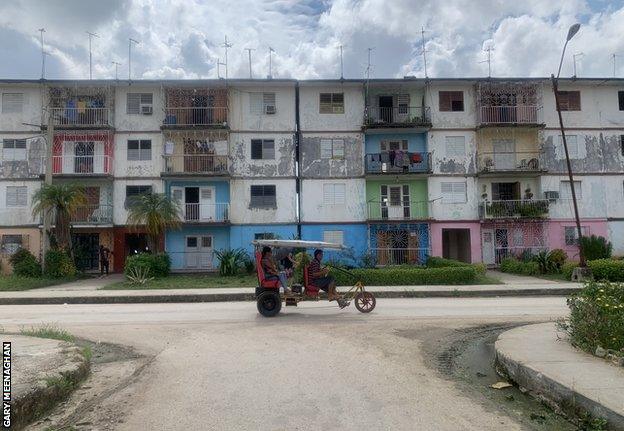
Hernandez spent his early years in Moron picking mangos, playing with marbles, and watching turkey vultures soar through the sky
Born here in 1993, Hernandez left when he was six and has returned only a few times. His mother, Yaneisy Mayea, met a German tourist in the mid-1990s. A year later she accepted a proposal to marry and emigrate to the small town of Gutersloh, an hour's drive east from Dortmund. It was a decision that not only changed a 21-year-old single mother's life forever, it also set her son on the journey from Cuba to Carrow Road.
"When I went to Germany, Onel stayed here," Yaneisy tells BBC Sport from inside her grandmother's modest mint-green home in Moron.
"It was difficult to leave him of course, but his father needed to sign a document authorising me to take him to Germany and he refused. Onel stayed with my mother for two years before his father eventually agreed to give permission."
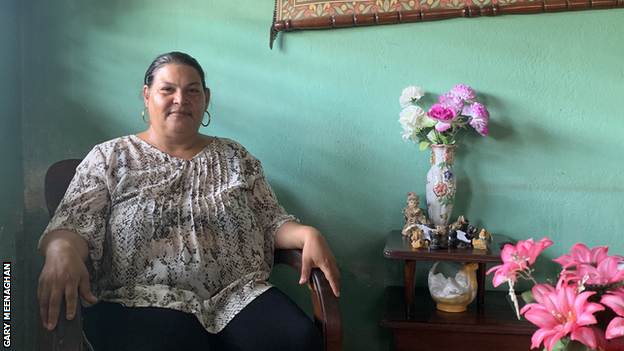
Hernandez's mother, Yaneisy Mayea, returned to Cuba 10 years ago after separating from her German husband
Hernandez spent those intervening years enjoying a simple childhood: attending nursery, picking fresh mangos off his neighbours' trees, playing with marbles in the street. He would watch with interest as turkey vultures soared through the sky in search of their next meal. When the time came to move, he cried all the way to the airport, confused and distressed to be leaving the only home he knew.
Without a word of German and with no friends, it was a difficult transition. But Hernandez's stepfather was a football coach and suggested the sport might help him settle in. Pushed on by Yaneisy shouting in Spanish from the sidelines, Hernandez went on to play for the junior sides of FC Gutersloh and LR Ahlen before joining Arminia Bielefeld's academy aged 14.
"Since he was very young, even here in Cuba, he would ruin his shoes from kicking the stones so much," recalls Yaneisy, who returned to Moron 10 years ago and now owns a farm where she rears cows and pigs. "The last time he visited, I reminded him and he said: 'Yes mum, I've always had this game in my blood.'"
On 1 October 2010, then-Bielefeld coach Christian Ziege handed a 17-year-old Hernandez his professional debut. Ten days later, he was capped by Germany U18s.
"Onel was a hard-working young player with a lot of talent and speed," recalls former Germany, Bayern Munich and Liverpool defender Ziege. "He listened a lot and tried hard to do the things we asked him. He could go past people for fun and was always a threat, so we decided he was ready to play."
Within a month however, Ziege had left and Hernandez was back training with Bielefeld's U23s. After spells with Werder Bremen II and Wolfsburg II, he joined Eintracht Braunschweig, where he scored five goals to help bring them within touching distance of promotion to the Bundesliga.
In January 2018, he was sold to Norwich for 2.5m euros (£2.2m). "Onel," said Braunschweig's sporting director Marc Arnold, "far exceeded all our expectations".
Arriving in a new country once again, Hernandez showed his speed both on and off the pitch, quickly picking up enough English to bond with fans and enjoying a productive first full season in England over 2018-19.
He scored eight goals and claimed 10 assists to help the Canaries finish top of the Championship and celebrated on the Carrow Road pitch draped in a Cuban flag. He even declared his love for Argos. Norwich were promoted. The Premier League was next.
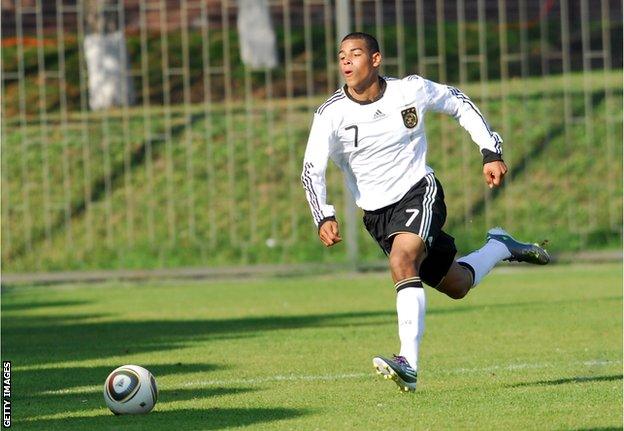
Hernandez, playing for Germany U18s in October 2010
On the opening day of the 2019-20 season, Hernandez made history when he came off the bench at Anfield, adding his Caribbean island homeland to the ever-expanding list of countries to be represented in England's top flight. His 20-minute cameo, however, generated little interest back in Cuba. Strangely, he remains an unfamiliar figure.
"Onel played one time for Germany U18s and had the chance to continue, but his dream has always been to play for Cuba," says Yaneisy, who acts as the intermediary between her son and the country's football association.
"I have been to Havana many times for meetings, but why they haven't called on him yet is something I don't think I will ever understand."
In the capital Havana, the owner of the football-themed El Angel de Tejadillo bar does not know who Hernandez is, even when shown a photo. A Cuban tour guide in Trinidad wears a Barcelona shirt and speaks of his love of football, but has never heard of his trailblazing compatriot. Osvaldo Suarez, who runs a guesthouse in Varedero, watched Norwich's game at Liverpool and remembers the commentators saying Hernandez was the first Cuban to play in the league, but admits it did not mean much to him.
"I haven't seen him play since," he says. "It's difficult to follow his career here because he doesn't play for one of the big teams so we don't get much news. Internet is expensive and most Cubans use it for social media rather than searching news.
"It makes me proud that he's playing in an important league though. I'd like to hear more, but in Cuba the truth is guys like Neymar and Messi are more important."
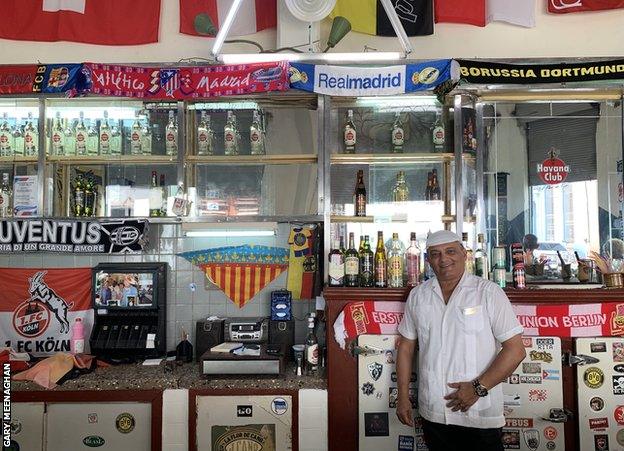
Abel Mesa Lopez, part-owner of El Angel de Tejadillo, a football-themed bar in Old Havana, did not recognise Onel Hernandez when shown a photo
Even in Moron, recognition is rare. A group of bare-chested youths kick around a worn-out ball on a cobbled street close to Hernandez's great-grandmother's home, yet they recognise neither his name nor his photo.
A taxi driver when asked if he likes football reaches excitedly for his phone, but rather than producing a selfie with his notable former neighbour, instead displays a stock image of Cristiano Ronaldo.
"The problem is that football in Cuba is not like Germany or England or other countries," says Yaneisy, seated next to a small signed photo of her son in a Braunschweig shirt. "Football is not the main sport and is not followed by a lot of people - but the people who follow football know my son, for sure."
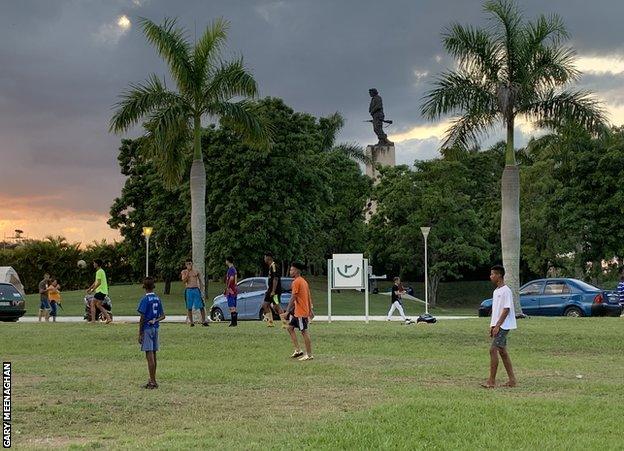
A group of youths play football at the feet of a statue of Che Guevara
At the northern tip of the town sits the Academia Provincial de Deportes Aurelio Janet Torres, a sports centre dedicated to the Cuban javelin thrower who died in a car crash just weeks after competing at the 1968 Olympics. A simple pastel-pink complex, it provides boxing, athletics and football training to local children. A pair of shoes dangle on an overhead telephone line.
Nearby, Luis Enrique is coaching kids on a dry, overgrown field. "Onel never trained here, but everybody who is involved in football knows who he is," he says. "When he made his Premier League debut, there was a lot of excitement in Moron. We couldn't watch it, but for us to have a Cuban there and follow everything he is doing, it is a source of great pride."
Traditionally, Cuba may be more bewitched by baseball and boxing, but football has a history here too. The country appeared at the 1938 World Cup in Italy, beating Romania before losing 8-0 to Sweden. Cuban president Fidel Castro was even rumoured to support Arsenal - although it may have had more to do with the club's name than performances on the pitch.
Since the 1960s, baseball in Cuba has been pitched not only as a sport but a means of fighting the perceived 'enemy' that is the United States, says Mario Lara, a Cuban football historian. When the country's best baseball players started to defect to the USA a decade ago, the authorities tried to cover it up with football.
"They didn't expect it to be popular. But once soccer touches you, it gets in your system," says Lara. "What the government tried to use as a solution became like a disease for them, because now many people in Cuba love soccer and it is baseball that is suffering."
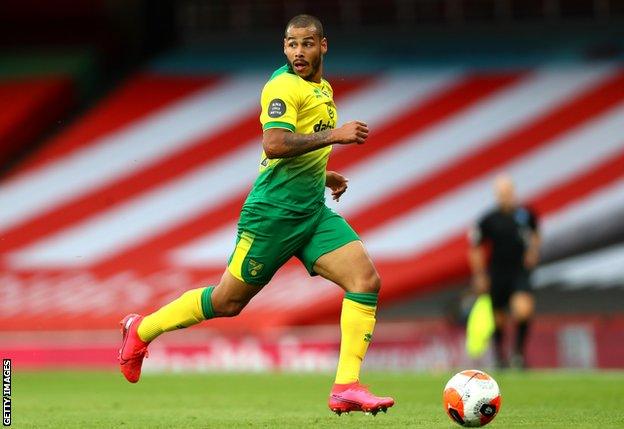
Hernandez and Norwich appear to be fighting a losing battle against relegation this season
There are certainly signs football is on the rise. A weekly highlights package is shown by national broadcaster Tele Rebelda and newspaper JIT has started carrying results from around the major leagues. As internet access slowly becomes more widely available, coach Enrique not only expects Hernandez's prominence to grow, but for his fame to help football grow further too.
"Onel can be for Cubans like Messi is for Argentinians - an inspiration," says Enrique. "That's why it's important the children see him and get to know him, because he can push more people to play football. We all hope and dream that one day, sooner or later, he will be able to play for the Cuba national team."
Precisely why the only Cuban to ever play in the Premier League is yet to be capped by his national team can be explained only by the Cuban Football Association - who did not respond when contacted for comment for this article. Cuba generally does not call on overseas-based players, although Lara believes it is slightly more complex. The reason for overlooking the country's most significant player, he says, is political.
"The Cuban FA is controlled by Inder [the government department for sport and physical recreation]. Everything that happens within football in Cuba goes through them," says Lara, who has been documenting his country's relationship with the game for close to a decade.
"For a player to play for the national team, that player has to have a contract through Inder. It's crazy, but it's the Cuban government who decide who plays for the national team - and it's been like this for a long time. What surprises us is that Fifa is so soft on them."
Former Cuba head coach Raul Mederos appeared to confirm this relationship, telling OnCubaNews.com before last summer's Concacaf Gold Cup: "I don't want to talk more about the issue of call-ups. I don't have an answer; I can't resolve anything. To know, you have to go to Inder and ask those who decide there."
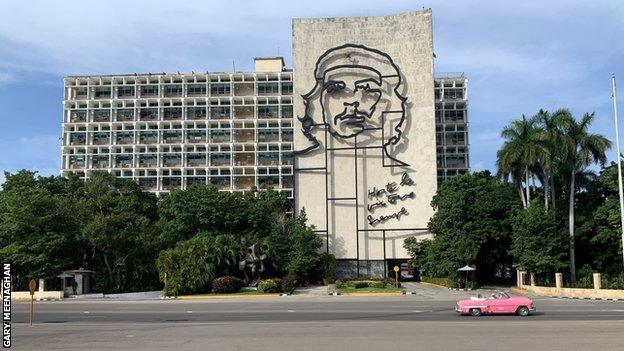
Based in Havana amid the muscle cars and memories of the revolution, the Cuban Football Association has received several visits from Hernandez's mother
Mederos was in charge in November 2018 when Hernandez seemed to be on the cusp of a historic debut. Norwich tweeted that their player had been called up for a Nations League qualifier against the Dominican Republic, but Yaneisy was asked two days before the match in Havana to tell her son not to travel. He would not be involved.
"They have never given me a concrete answer why," Yaneisy says. "Onel had everything ready to come and at the last moment they said he could not. When I told him, he said: 'Mum, go to Havana and tell them I'll pay for my flights, my hotel, my food. Tell them that I just want to play!'
"I went, but it was no use. I got no answers. It was never explained to me."
Cuba could certainly do with a little more talent on the pitch. At last summer's Gold Cup, the Leones Del Caribe played three, lost three, scored none and conceded 17. "We need a guy like Onel because he can be the face of Cuban football," adds Lara.
"He's a quality player and has this aura around him because he's the first to play in the Premier League. Any other country in the world would use that.
"Unfortunately, Cuba isn't any other country in the world. It's kind of special."